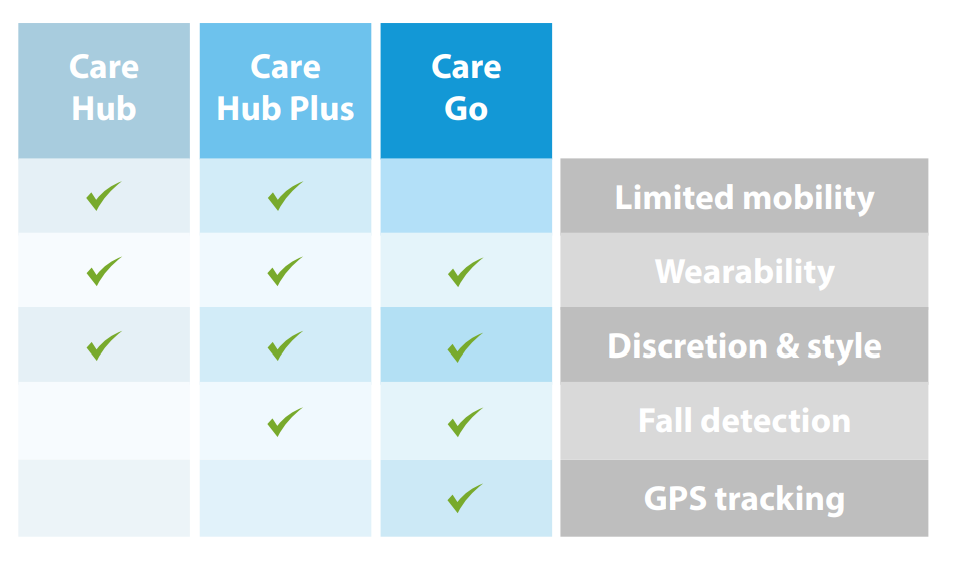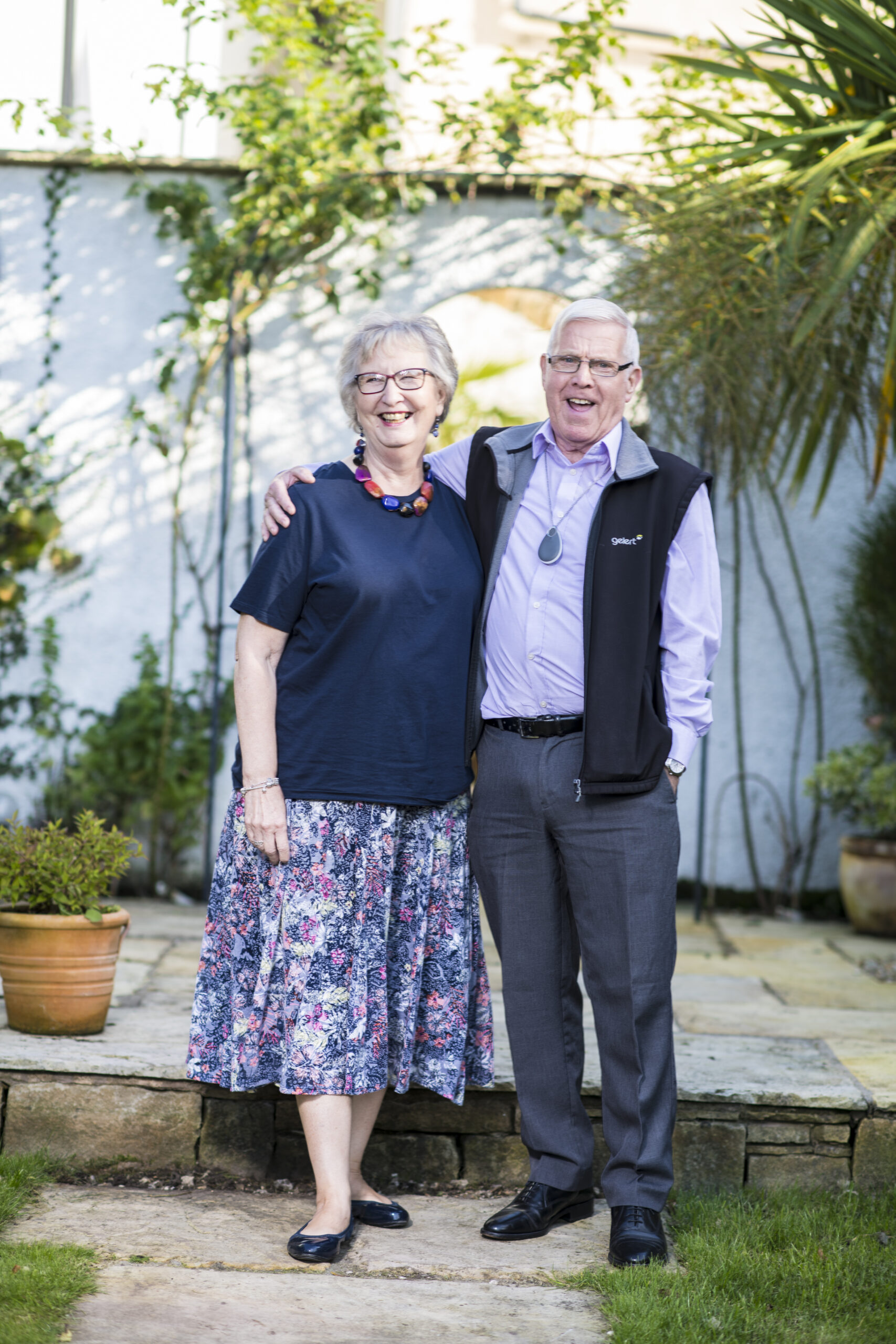Knowing which personal alarm is right for your elderly relative can be tricky. Millions of families struggle with the dilemma every year, and it’s not a decision to be taken lightly. Before you start looking for a personal alarm it’s good to know and consider the things below.
What is a personal alarm?
Personal alarms are a type of personal safety device. They are designed to keep you safe and make you feel more confident living on your own.
Personal alarm systems typically feature a pendant alarm and base unit. If at any time the wearer feels unwell or suffers a fall, they can press the panic button on their device to alert the monitoring centre.
At SECOM CareTech we have our own monitoring centre. So when a user activates their personal alarm, an SOS signal is sent to our 24-hour response team and the user’s emergency contacts via the SECOM Care app. Friends and family can then use the app to let us know if they are responding or need us to step in.
Why do older people use personal alarms?
There are various reasons why older adults use personal alarms for the elderly. Here are some of the most common:
Greater confidence
Lots of things can knock your confidence as you get older. Among the top causes are changes in health and mobility. Using a personal alarm can give someone in later life the security they need to stay active, maintain their physical health and become more confident.
Fall detection devices
People aged 65 and over are the most at risk of falling. Our fall alarms use clever motion sensors that detect sudden changes in direction and speed to work out if you have fallen over. If you do, the fall detection device can automatically send an SOS signal straight to your telecare provider so they know you need help.
A long-term health condition
Conditions like diabetes and arthritis become more common with age. These health issues make people more susceptible to falling over and increase their chances of feeling unwell and needing the emergency services.
Personal alarms allow elderly people to send for help at the press of a button. Our monitoring team is on hand 24 hours a day, 365 days a year and can share your medical details with the emergency services so they know what to expect before they arrive.
A cognitive disorder
Cognitive decline usually occurs after the age of 70. The onset of cognitive disorders like Alzheimer’s disease makes it harder for elderly people to take care of themselves.
A GPS pendant alarm allows the user to keep track of where they are. If a wearer gets lost, they can press the panic button on their personal device and ask the call handler to use the pendant’s GPS functionality to find out where they are.
What features should you look for in a personal alarm?
Appearance
Personal alarms come in lots of different shapes and sizes. Some are small and subtle, while others are more conspicuous. When shopping for a safe personal alarm, it’s important to think about how it looks. Many elderly and disabled people don’t want to wear a personal alarm that draws attention to their age or disability.
Wearability
Personal alarms are designed to fit around your life. They are small enough to wear 24 hours a day and can be worn on a necklace, wristband, brooch or keychain. Before buying an elderly personal alarm, ask your relative how they would like to wear their new device. This will make it much easier for them to integrate it into their everyday life.
Battery life
Inside every personal alarm is a battery. These power the device and make sure it’s always ready to raise an alarm.The batteries inside most pendant alarms are very reliable and have a lifespan of about five years. This ensures you never have to worry about your device losing function unexpectedly. High-quality alarms (such as the ones we supply) send low-battery warnings to our monitoring centre so we can replace them in a timely manner free of charge.
Signal range
Our Care Hub and Care Hub Plus packages use two separate devices to keep you safe: a base unit and a pendant alarm. The base unit contains a SIM card for contacting our monitoring centre, and the pendant alarm uses a small radio transmitter to send an SOS signal to the base unit. Together, the two devices let you raise an alarm from anywhere in your home.
If you’re interested in a similar system, keep in mind the signal range of the two devices. Most can cover the whole house, keeping you safe in every room. But if you or a loved one is a keen gardener, you’ll need to invest in a safe personal alarm with sufficient range to protect you indoors and out.
GPS (Global Positioning System)
GPS alarms, such as the Care Go, are designed for more active seniors who want to continue their independent living with confidence. These devices can be used to call for help if the user feels unwell while they are out of the house. GPS trackers use roaming SIM cards to connect to the strongest local network and are ideal for families where wandering is an issue. If a user gets lost, they can press the button on their elderly personal alarm and reach the monitoring centre in seconds. The call handler will use the device’s GPS functionality to establish their location and send for help.
Fall detection
Falls are the biggest cause of emergency hospitalisation among the elderly and can result in “long lies”, a major contributing factor for older people moving into residential care. If your elderly relative is frail or suffers from a condition like Parkinson’s disease, a personal alarm with fall detection can significantly reduce their chances of falling over and being stuck on the floor for a prolonged period of time.
Waterproof personal alarm
Bathrooms are a high-risk area for elderly people to experience falls. As such, being able to use your personal alarm while you bathe is really important. Before subscribing to a monitoring service, check with your provider to find out what level of water resistance your pendant alarm has. Although most personal alarms come with a degree of waterproofing, providers don’t always make it clear how safe they are to use in the bath or shower.
What should you look for in a monitoring service?
Picking the right monitoring service is just as important as selecting the right personal alarm. When you come across a provider you like, one of the first things you should do is evaluate how much information they offer about their products and services. The more diligent providers will want to help you find a personal alarm that’s right for you or your loved one, and may even ask to visit their home so they can assess the property.
Connectivity and futureproofing
Traditional telecare services operate using landlines. In recent years, personal alarm providers have started moving away from this type of connection in favour of SIM cards as the telecoms industry is replacing analogue telephone lines with VoIP, a newer digital technology.
The migration to digital is going to take several years, with the switchover lasting until 2025. Joining a personal alarm service that doesn’t rely on landlines means the migration to VoIP won’t affect your service or your personal alarm.
CareTech by SECOM offers futureproof personal alarms linked to mobile phones via its app. The digital switchover won’t affect the service, so you can enjoy ultimate peace of mind once you’ve chosen the best personal alarm to suit your elderly relative.
In-house monitoring centre
A personal alarm is no good without a 24-hour monitoring service. Before subscribing to a telecare provider, make sure they are accredited by the TSA, the industry body for Technology Enabled Care (TEC), and have a customer care line that users can call to resolve non-emergency and troubleshooting issues. Fortunately SECOM CareTech is TSA approved and has an award-winning monitoring centre and customer care team on hand.
In addition to verifying your provider’s credentials, ask if their monitoring centre is in-house or operated by a third-party company. Many personal alarm services outsource their monitoring, which means the people who monitor you could be employed by an external provider. By opting for a company that supplies both the personal alarm and monitoring, you know where your personal device has come from and who is monitoring it.
Pricing
The cost of a personal alarm service is usually no more than £450 per year. Reliable personal alarm providers will explain their pricing clearly, breaking down each payment. Most personal alarm services ask for a one-off payment upfront. This covers the delivery and registration of your device.
Once your device is set up, you will be given the options to pay for your 24-hour monitoring. You can pay for this in one go (usually the full contract period), annually or in smaller monthly instalments. Whichever is easiest for you and the individual who’s having their homecare independent living needs met.
VAT exemption
VAT is a sales tax added to goods and services sold in the UK. It is taxed at 20 per cent. Products and services that are sold to people with disabilities or those with long-term health conditions are sometimes exempt.
When shopping online, be sure to look for elderly personal alarms that exclude VAT if you or your relative qualifies . A quality service provider will advertise these lower prices.
To qualify for VAT exemption, you must either:
- Have a physical or mental condition that significantly affects your everyday life
- Be diagnosed with a condition that is regularly treated by a medical professional
- Be experiencing a terminal illness
Which personal alarm is right for your elderly loved one?
Prior to beginning your search for a personal alarm, talk to your loved one about how wearing a personal device will make them feel. Personal alarms are proven to improve elderly people’s safety, but only those who wish to use them. If your relative says they will not wear their alarm, it’s important you listen. People who don’t wear their pendant alarm are in danger of friends and family wrongly assuming they are protected.
Once you are sure a personal alarm is what your loved one wants, talk to them about their health, mobility and budget. These things will help you decide which alarm they should get and the additional features they will need.
Take a look at our personal alarm table. It breaks down our range of personal alarms for the elderly into five categories: mobility, wearability, discretion, fall detection and GPS tracking. You can use it to work out which personal alarm is right for your elderly loved one.

